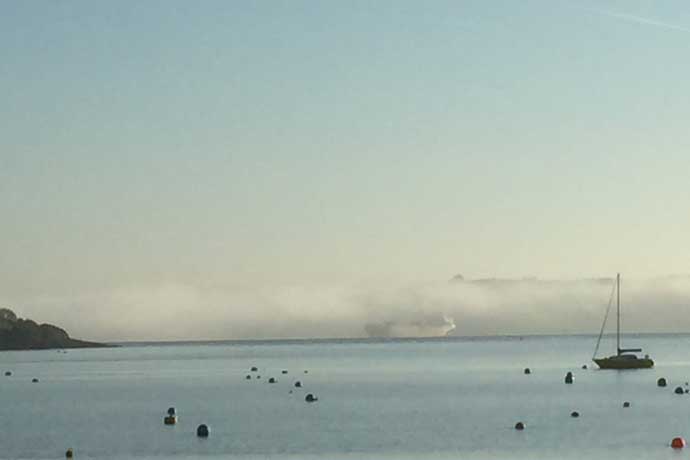But I’m okay with that. I’m all for getting out and doing stuff. Whingeing on social media, not so much. [Yes, I know. But this isn’t social media; it’s my website.] Marching beats signing petitions, and signing petitions beats moaning about Brexit privately and/or on social media. And all of the above beat the sheer paranoid inertia of telling me that our children’s children’s futures have been blighted by that referendum. If a generation is twenty-five years, say, and two generations is, er, not far off fifty-ish years, that means the reverberations of the 2016 People’s Vote will still be felt in 2066. Which is a bit like saying … let me see, fifty years back from 2019 … that we’re living lives blighted by the events of 1969. And if you look back at 1969, you see how ridic–
Oh! The internet was invented in 1969 (ARPANET), the modern gay rights movement in the USA got started (after the Stonewall riots) and the first cash machine (ATM) went live. Moon landing, cold war, et cetera. It was an interesting year after all, and there goes my third paragraph. I take back the word “blighted,” but apart from that – yeah, okay. Maybe in 2069 we’ll be three years out from another People’s Vote on the EU, and parliament will be conducting a series of “indicative votes” to find out what it thinks – sorry, to “take control,” I mean. That’s what my radio said these votes were intended to achieve. Stop laughing; this is a serious subject. No, really. Parliament’s “taking control”. I said stop laughing!*
But what if we’re wrong? What if Brexit isn’t the big historic thing? What if it’s the 2019 equivalent of, oh, I don’t know, the 1969 publication of Barbara Castle’s In Place of Strife white paper, which of course has transformed all of our lives and continues to drive political debate today? Or more accurately – doesn’t. What if the writing on those placards you were carrying last Saturday isn’t the writing on the wall? Sorry. That was just too neat to resist. What I mean is – what if Brexit itself doesn’t matter so much, but – in 1969, the Stonewall riots caused far longer-lasting change than any of the politicians did – the marching and the shouting and the banner-waving do matter?
My sources tell me (okay, I’ve just googled the phrase) that the original “writing on the wall” appeared while King Belshazzar of Babylon was hosting a feast. What it said was “Numbered, numbered, weighed and they are divided,” and what it was interpreted to mean was “Your formerly united kingdom is about to collapse, guv.” Which – if you’ll allow for the very loose translation – is peculiarly appropriate. W B Yeats wrote the poem in which the phrase “The centre cannot hold” appears, and Alfred Hitchcock’s screen-writing associate Angus MacPhail came up with the term “the MacGuffin” to describe “the desired object that serves to advance the plot” (thanks, Wikipedia).
What if Brexit’s the MacGuffin that we’re all chasing in a historical narrative that’s all about the chase? Yes, Leave/Remain does matter, up to a point, and yes, I suppose the terms of the withdrawal are important. But this important? Really? I don’t know whether there’s a “silent majority” of “shy Tories” or “shy Leavers” who would take us all by surprise in the event of a second referendum, but I do suspect that tomorrow’s historians will focus more on the noise of this one than the substance. If you filter out the issue itself, you’re left with: a government that doesn’t seem able to govern; an opposition that doesn’t seem able to oppose; a cast of serial forecasters prophesying a doom that never quite arrives; our Brexit-obsessed media; our failing nation state; a climate that’s warming us into extinction anyway…
…and a heck of a lot of noise that seems to be coming from the people. We’re not “populists”, because that term now refers to autocratic right-wing leaders and would-be leaders of EU member states, but the “national conversation” does seem to be running kind of hot. And what I think about that is: we’re all so very networked these days, so wholly connected to the means of self-expression, that a five-year cycle of voting in a bunch of remote representatives to make our decisions for us – or fail to do that, ha ha – just doesn’t do it for me. I like the idea that parliament’s “taking back control,” or taking control, or whatever it’s doing (ha ha ha ha ha ha ha – sorry), but I suspect that what really happening here is a kind of chaotic subsidiarity.
And if you’re not familiar with that term, it’s defined in Article Five of the Treaty on European Union (2007). Or let’s try the internet. “Subsidiarity is a principle of social organization that holds that social and political issues should be dealt with at the most immediate level that is consistent with their resolution.” Go, Wikipedia! And if we run that through the same translation software as we used for the writing on the wall, we get the idea that if government can’t govern, parliament has a go, and if that doesn’t work, we try another People’s Vote, and if we’re still arguing, well, we’ve all got the smartphones we need to muster an English Spring, which is like an Arab Spring (other constituent nations of the United Kingdom are available) but without the firearms.
We end up with politicians who are within range of our dissent. If the current arrangement of remote government (sic) by total strangers in armoured saloon cars with motorcycle outriders doesn't work, and if it doesn't work because they're out of touch with the national conversation as it is now being conducted (via technology, on social media, et cetera), then I suggest that we forget about national government and devolve power down to "administrative units" no bigger than you could realistically fit into a smartphone's contact list. [By the way, look up “How Belgium Survived 20 Months Without a Government” online.] We’re due for a big rethink (post-mortem) on how national government works (or rather, doesn't), and whether we plan this or it just happens, I suggest that short-range government (the term "local government" is already in use) will prove to be both workable on a human scale and compatible with our technology.
Now, I realise I’ve written this post in a digital format in the middle of the Modern Dark Age, but just in case it does survive, here’s a footnote for future historians. You’ll know that we went over to digital storage for all our important records – we called it “the cloud” – without properly thinking through the tendency of digital storage to decay, and I’m sorry that we’ve left nothing behind except a pile of plastic bottles – but in case you’re wondering, “Brexit” was the name we gave to an early attempt by one of the states to secede from Europa (then known as “the EU”), and if you do have that much, Brexit fits into the timeline before Grexit, Frexit and the European Civil War. Yes, all those terms with "-exit" attached refer to episodes of civil unrest.
And if you’re reading this in 2069 and you think I might be your long-lost grandfather – sorry about the mess.
*They've rejected every option! Okay, you can laugh now.
We’re all resentful. Somebody’s either in the wrong, or too stupid to see the obvious truth as we see it, or both. And yet they have the power to ignore us. Which is Not Fair! And all that comes across in the tone of voice. [Sorry, grammar-check; I am going to start that sentence with ‘And’.] If you post about politics, it’s very easy to sound mulish and dogmatic, and if you reply to comments on your post about politics, it’s very easy to sound irritable and impatient with your readers’ failure to see the obvious truth as you’ve seen it.
If you’re a writer, say, you might even end up attacking potential buyers of your book. More likely than that, and more damaging – your sarcastic side is on display, for however long, to any potential buyer of your book who googles your name. And that is absolutely not a good look. Social media for writers is a matter of being the person who writes those books. For creative and interesting people – other creative and interesting people, sorry – it’s a matter of being creative and interesting.
I don’t say this is an absolute ban, and if you want me to know what you think about [yes, that], okay, but please try to foam at the mouth in a way that doesn’t ruin my first coffee of the day. Then you can wear the noise-cancelling headphones and I’ll tell you what I think about [yes, that]. And then we’ll part, and spend the next hour feeling less friendly towards each other. We won’t change our views, because politics isn’t a rational weighing-up of The Facts; it’s a conjunction of upbringing, tribal loyalty, peer-group pressure (however light) and observation.
I agree with you that this is happening – observation, check – but we’ll never agree on who to vote for in the hope that they’ll do something about it because you’re you and I’m me. And they’re them as well, come to think about it. My own problem (headphones, anybody?), very briefly, is that politics is ephemeral. Five years from now, we’ll look back at [yes, that], and only be able to see it in the rosy glow of what happened next. By then, we’ll be panic-stricken about the next-but-several big issue. Which is my other problem. We’re too excited. Why? Millions sign petitions. Millions march. Change happens slowly, if at all. Life goes on. Five years from now…
Perhaps that’s a political view, and I shouldn’t bother you with it. I want to bring this post round to saying that if you’re a creative person, writer or otherwise, touch all of your output with your creativity. Don’t subordinate your vision to some focus-grouped manifesto. March, yes, sign the petition, yes. But hold onto what you are. Don’t just share the outrage; feel it your way and express it your way. Write the story, make the film, post the gif, vlog about what you were wearing on the march - do what you do best. I don’t want to know that you think the same way as everybody else riding the same bandwagon; I want the story told as only you can tell it.
Five years from now – must put this in my calendar – I’m going to write a post about how chaos and confusion, even repression, are conducive to great art. It’ll get past the censors, because I’ll tap it out on an old typewriter rather than a connected device, and I’ll make the first copies using carbon paper. By then, I’ll be running a publishing company that has actual printing presses concealed around the neighbourhood, and one whole cell of the resistance will be dedicated to online shopping in our names, using our digital identities, to confuse the surveillance economy as to who we are.




